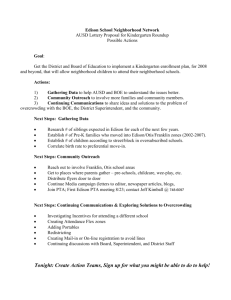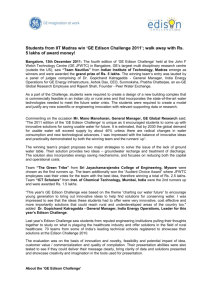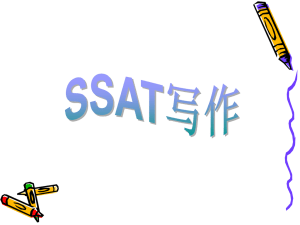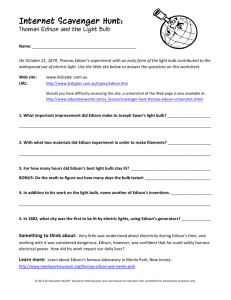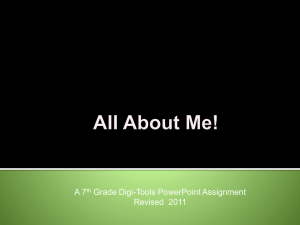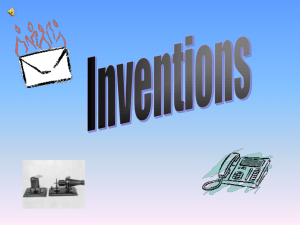Power Vocabulary Power Vocabulary
advertisement
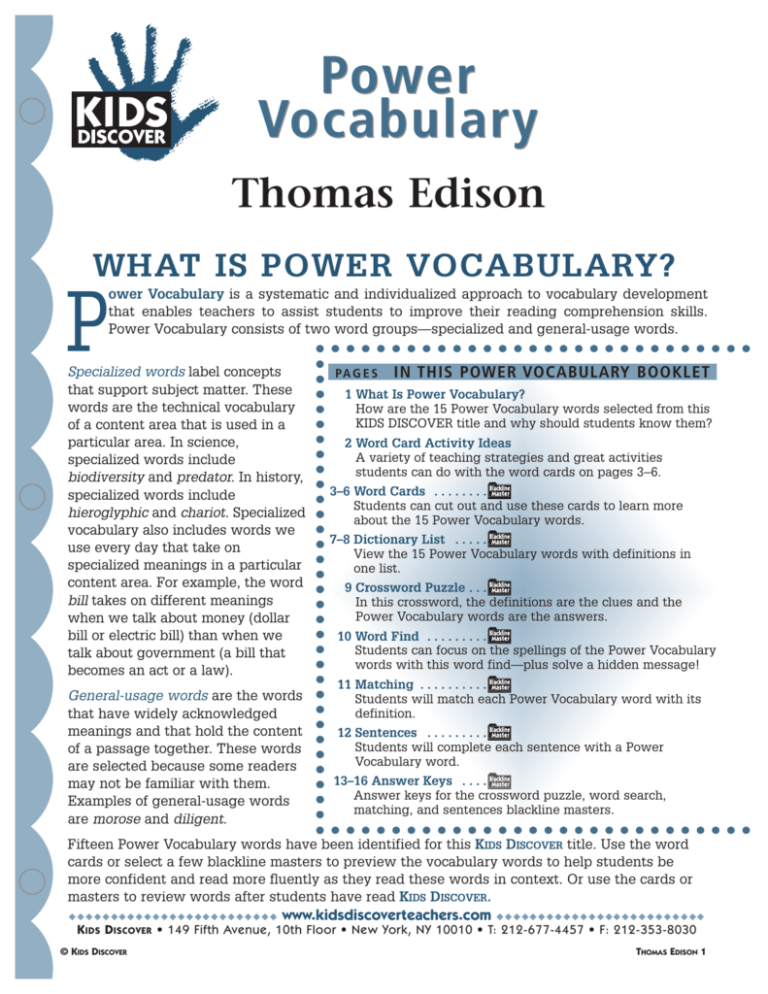
Power Vocabulary Thomas Edison WHAT IS POWER VOCABULARY? P ower Vocabulary is a systematic and individualized approach to vocabulary development that enables teachers to assist students to improve their reading comprehension skills. Power Vocabulary consists of two word groups—specialized and general-usage words. Specialized words label concepts that support subject matter. These words are the technical vocabulary of a content area that is used in a particular area. In science, specialized words include biodiversity and predator. In history, specialized words include hieroglyphic and chariot. Specialized vocabulary also includes words we use every day that take on specialized meanings in a particular content area. For example, the word bill takes on different meanings when we talk about money (dollar bill or electric bill) than when we talk about government (a bill that becomes an act or a law). General-usage words are the words that have widely acknowledged meanings and that hold the content of a passage together. These words are selected because some readers may not be familiar with them. Examples of general-usage words are morose and diligent. PA G E S IN THIS POWER VOCABULARY BOOKLET 1 What Is Power Vocabulary? How are the 15 Power Vocabulary words selected from this KIDS DISCOVER title and why should students know them? 2 Word Card Activity Ideas A variety of teaching strategies and great activities students can do with the word cards on pages 3–6. 3–6 Word Cards . . . . . . . . Students can cut out and use these cards to learn more about the 15 Power Vocabulary words. 7–8 Dictionary List . . . . . View the 15 Power Vocabulary words with definitions in one list. 9 Crossword Puzzle . . . In this crossword, the definitions are the clues and the Power Vocabulary words are the answers. 10 Word Find . . . . . . . . . Students can focus on the spellings of the Power Vocabulary words with this word find—plus solve a hidden message! 11 Matching . . . . . . . . . . Students will match each Power Vocabulary word with its definition. 12 Sentences . . . . . . . . . Students will complete each sentence with a Power Vocabulary word. 13–16 Answer Keys . . . . Answer keys for the crossword puzzle, word search, matching, and sentences blackline masters. Fifteen Power Vocabulary words have been identified for this KIDS DISCOVER title. Use the word cards or select a few blackline masters to preview the vocabulary words to help students be more confident and read more fluently as they read these words in context. Or use the cards or masters to review words after students have read KIDS DISCOVER. ......................... www.kidsdiscoverteachers.com ......................... K D • 149 Fifth Avenue, 10th Floor • New York, NY 10010 • T: 212-677-4457 • F: 212-353-8030 IDS ISCOVER © KIDS DISCOVER THOMAS EDISON 1 P OW E R VO C A BU L A RY WO R D C A R D AC T I V I T Y I D E A S se the vocabulary cards (pages 3–6 of this Power Vocabulary U booklet) and the following activities to introduce or review some Power Vocabulary words students will encounter while reading K I D S D I S C OV E R Thomas Edison. Pe rs o n a l D i c t i o n a r y bizarre ) (bi-zar e adjectiv R COVE KIDS DIS Moon ◆ Copy the word and definition pages back-to-back for each student. Have students cut out the cards and place them in alphabetical order. To make personal dictionaries, students can staple the cards together in a flipbook or place them in a file box. N e w Wo rd C a rd s BIZAR RE: ve ry str ange o ★ The r odd party characte was filled with rs weari b ng black izarre purple ti masks an es. d ★ H ow ever, it takes C to comp ru it hne 770 lete its years bizarre Words You Know and Words to Know ◆ Ask students to draw a four-column chart and label the columns “I don’t Know,” “I’ve seen or heard but don’t know the meaning.” “I think I know the meaning,” and “I know the meaning.” Present each word and its sample sentence to students. Ask them to write the word in the column that shows how well they know the meaning of the word. Memory Game ◆ Copy the word and definition pages on separate sheets of paper. Cut out the cards and place them facedown on a table. Have students play a memory game by matching words and definitions. Students should read the words and definitions aloud each time they have a match to reinforce the pronunciation and definition. Challenge: Use correction fluid or tape to cover the vocabulary words on the definition cards. Matching ◆ Copy the word and definition pages on separate sheets of paper and cut out the cards. Paste the word cards around the edge of tagboard. Ask students to attach the definitions to their words using clothespins. ◆ Have students create their own vocabulary cards for unfamiliar general-usage or content words as they read KIDS DISCOVER. S k i m m i n g t h e Te x t ◆ Help students practice skimming text. Read a sentence or word and the page number in the magazine where it is located. (The sentences and page numbers are provided on the definition side of the cards.) Model how to skim the page for the word or sentence. Then have students practice skimming by looking for other words or sentences. Challenge: Give students a sentence without the page number. Encourage them to skim the magazine for the appropriate topic pages and then skim for the word. Dictionary Skills ◆ Practice dictionary skills by asking students to find the guide words on the page where a Power Vocabulary word is located in a dictionary. Also ask students to search for multiple meanings of words, synonyms, antonyms, and other word forms or parts of speech for the word. Jo u r n a l W r i t i n g ◆ After working with the words and definitions, encourage students to use the words when writing essays and in their journals. Dangling Definitions ◆ On sturdy paper, make enlarged copies of the word and definition cards printed back-to-back on study paper. Punch a hole in the top center of each card and attach to the ceiling with string.❖ ......................... www.kidsdiscoverteachers.com ......................... K D • 149 Fifth Avenue, 10th Floor • New York, NY 10010 • T: 212-677-4457 • F: 212-353-8030 IDS ISCOVER © KIDS DISCOVER THOMAS EDISON 2 colleague conceivable (kol-eeg) (kuhn-seev-uh-buhl) noun adjective KIDS DISCOVER Thomas Edison KIDS DISCOVER Thomas Edison domestic emigrate (duh-mes-tik) (em-uh-grayt) adjective verb KIDS DISCOVER Thomas Edison KIDS DISCOVER Thomas Edison exclusively immerse (ek-skloo-suhv-lee) (i-murs) adverb verb KIDS DISCOVER Thomas Edison KIDS DISCOVER Thomas Edison innovation inquisitive (in-uh-vay-shuhn) (in-kwiz-uh-tiv) noun adjective KIDS DISCOVER Thomas Edison © KIDS DISCOVER KIDS DISCOVER Thomas Edison VOCABULARY CARDS CONCEIVABLE: imaginable Life before the Internet is not conceivable to many people today. He is interested in every conceivable subject and he recognizes no limitations. (p. 17) EMIGRATE: to leave one’s own country to settle in another one Many people have emigrated from their homelands in search of a better life in other lands. The Edison family had originally emigrated from Holland to New Jersey. (p. 6) IMMERSE: to become deeply involved in Karen was so immersed in the book she was reading, she completely lost track of time. Edison would immerse himself completely in a project, sometimes working on it for ten years. (p. 14) INQUISITIVE: questioning; curious His inquisitive nature led the boy to ask many questions about the world around him. Early in life, Edison showed the inquisitive mind—and experimental bent—of a scientist, sometimes to humorous effect, sometimes with near-disastrous results. (p. 6) © KIDS DISCOVER COLLEAGUE: someone a person works with; associate Edison and his colleagues at his lab developed an improved filament for the electric light bulb. Edison and his colleagues were known to work 24 hours a day. (p. 2) DOMESTIC: of or from one’s own country; not imported Goods made in China are imported goods, and goods made in the United States are domestic goods. However, foreign rubber prices dropped, and the desire for domestic rubber declined. (p. 15) EXCLUSIVELY: only, solely Her clothing is available exclusively through her own design house, not from stores. For a while he worked exclusively with platinum. (p. 13) INNOVATION: a new device or idea The electric vote recorder invented by Edison was an unwanted innovation that failed to sell. Many exciting innovations came out of this lab, including the phonograph and the incandescent light bulb. (p. 9) VOCABULARY CARDS intrigue patent (in-treeg) (pat-uhnt) verb noun KIDS DISCOVER Thomas Edison KIDS DISCOVER Thomas Edison prolific resort (pruh-lif-ik) (ri-zort) adjective verb KIDS DISCOVER Thomas Edison KIDS DISCOVER Thomas Edison solitude telegraph (sol-uh-tood) (tel-uh-graf) noun noun KIDS DISCOVER Thomas Edison KIDS DISCOVER Thomas Edison transcontinental _________________ (tran-skon-tuh-nen-tuhl) _________________ adjective _________________ KIDS DISCOVER Thomas Edison © KIDS DISCOVER KIDS DISCOVER Thomas Edison VOCABULARY CARDS PATENT: government document giving sole rights to an invention The holder of a patent is the only one who has the right to produce the invention for a certain amount of time. INTRIGUE: to interest greatly; to excite the interest of The telegraph intrigued Edison when he was a boy, so he was excited to become an operator. In his lifetime, Edison received patents for 1,093 inventions. (p. 2) At the age of six, intrigued with fire, Al started a small blaze in his father’s barn. (p. 7) RESORT: to use as a way of doing something when other ways do not work PROLIFIC: very productive, producing a lot His mother resorted to teaching Thomas at home when his schoolteachers could not handle him in class. To find the right filament, Edison resorted to his typical method—trial and error. (p. 13) TELEGRAPH: system for sending coded messages over electric wires Samuel F.B. Morse invented a practical telegraph in 1837. Some of Edison’s first inventions were improvements on the telegraph. (p. 4) _________________ The prolific writer has published more than 50 books and short stories. Edison may have been the most prolific inventor of his age, but he wasn’t the only one. (p. 5) SOLITUDE: state of being alone Edison enjoyed his solitude and did not mind being alone. He courted publicity for his inventions, but he was essentially a man who loved solitude. (p. 16) TRANSCONTINENTAL: across a continent _________________ Once transcontinental journeys took months, but today people can fly across North America in hours. _________________ The first transcontinental railroad was finished in 1869. (p. 4) © KIDS DISCOVER VOCABULARY CARDS Thomas Edison Dictionary List COLLEAGUE Pronunciation (kol-eeg) Part of Speech noun Definition someone a person works with; associate Edison and his colleagues at his lab developed an improved filament for the electric light bulb. Word Used in KIDS DISCOVER Edison and his colleagues were known to work 24 hours a day. (p. 2) CONCEIVABLE Pronunciation (kuhn-seev-uh-buhl) Part of Speech adjective Definition imaginable Life before the Internet is not conceivable to many people today. Word Used in KIDS DISCOVER He is interested in every conceivable subject and he recognizes no limitations. (p. 17) EXCLUSIVELY Pronunciation (ek-skloo-suhv-lee) Part of Speech adverb Definition only, solely Her clothing is available exclusively through her own design house, not from stores. Word Used in KIDS DISCOVER For a while he worked exclusively with platinum. (p. 13) IMMERSE Pronunciation (i-murs) Part of Speech verb Definition to become deeply involved in Karen was so immersed in the book she was reading, she completely lost track of time. Word Used in KIDS DISCOVER Edison would immerse himself completely in a project, sometimes working on it for ten years. (p. 14) DOMESTIC INNOVATION Pronunciation (duh-mes-tik) Part of Speech adjective Definition of or from one’s own country; not Pronunciation (in-uh-vay-shuhn) Part of Speech noun Definition a new device or idea imported Goods made in China are imported goods, and goods made in the United States are domestic goods. Word Used in KIDS DISCOVER However, foreign rubber prices dropped, and the desire for domestic rubber declined. (p. 15) EMIGRATE Pronunciation (em-uh-grayt) Part of Speech verb Definition to leave one’s own country to settle in another one Many people have emigrated from their homelands in search of a better life in other lands Word Used in KIDS DISCOVER The Edison family had originally emigrated from Holland to New Jersey. (p. 6) © KIDS DISCOVER The electric vote recorder invented by Edison was an unwanted innovation that failed to sell. Word Used in KIDS DISCOVER Many exciting innovations came out of this lab, including the phonograph and the incandescent light bulb. (p. 9) INQUISITIVE Pronunciation (in-kwiz-uh-tiv) Part of Speech adjective Definition questioning; curious His inquisitive nature led the boy to ask many questions about the world around him. Word Used in KIDS DISCOVER Early in life, Edison showed the inquisitive mind—and experimental bent—of a scientist, sometimes to humorous effect, sometimes with near-disastrous results. (p. 6) THOMAS EDISON 7 Thomas Edison Dictionary List (continued) INTRIGUE SOLITUDE Pronunciation (in-treeg) Part of Speech verb Definition to interest greatly; to excite the interest Pronunciation (sol-uh-tood) Part of Speech noun Definition state of being alone of The telegraph intrigued Edison when he was a boy, so he was excited to become an operator. Word Used in KIDS DISCOVER At the age of six, intrigued with fire, Al started a small blaze in his father’s barn. (p. 7) Edison enjoyed his solitude and did not mind being alone. Word Used in KIDS DISCOVER He courted publicity for his inventions, but he was essentially a man who loved solitude. (p. 16) PATENT TELEGRAPH Pronunciation (pat-uhnt) Part of Speech noun Definition government document giving sole Pronunciation (tel-uh-graf) Part of Speech noun Definition system for sending coded messages rights to an invention The holder of a patent is the only one who has the right to produce the invention for a certain amount of time. over electric wires Samuel F.B. Morse invented a practical telegraph in 1837. Word Used in KIDS DISCOVER In his lifetime, Edison received patents for 1,093 inventions. (p. 2) PROLIFIC Pronunciation (pruh-lif-ik) Part of Speech adjective Definition very productive, producing a lot The prolific writer has published more than 50 books and short stories. Word Used in KIDS DISCOVER Edison may have been the most prolific inventor of his age, but he wasn’t the only one. (p. 5) Word Used in KIDS DISCOVER Some of Edison’s first inventions were improvements on the telegraph. (p. 4) TRANSCONTINENTAL Pronunciation (tran-skon-tuh-nen-tuhl) Part of Speech adjective Definition across a continent Once transcontinental journeys took months, but today people can fly across North America in hours. Word Used in KIDS DISCOVER The first transcontinental railroad was finished in 1869. (p. 4) RESORT Pronunciation (ri-zort) Part of Speech verb Definition to use as a way of doing something when other ways do not work His mother resorted to teaching Thomas at home when his schoolteachers could not handle him in class. Word Used in KIDS DISCOVER To find the right filament, Edison resorted to his typical method—trial and error. (p. 13) © KIDS DISCOVER THOMAS EDISON 8 Name ____________________________________________ Date _________________ Crossword 1 solitude telegraph transcontinental patent prolific resort innovation inquisitive intrigue emigrate exclusively immerse colleague conceivable domestic 2 3 4 5 6 7 8 9 10 11 12 13 Across 1. across a continent Down 1. system for sending coded messages over 3. imaginable 5. state of being alone 2. 6. of or from one’s own country; not imported 3. 8. to use as a way of doing something when 4. other ways do not work 9. to interest greatly; to excite the interest of 12. to leave one’s own country to settle in another one 13. questioning; curious © KIDS DISCOVER 7. 10. 11. electric wires only, solely someone a person works with; associate a new device or idea very productive, producing a lot to become deeply involved in government document giving sole rights to an invention THOMAS EDISON 9 Name ____________________________________________ Date _________________ Word Find Circle each word from the box in the letter grid below. The words are up and down, across, backwards, and diagonal. Then, going across each row starting at the top left, place each unused letter on a blank until you reveal the hidden message. T E L E G R A P H I L A X O N N S N _ _ _ _ _ _ © KIDS DISCOVER N B T C N V T O O Q A N L E C C L I U V E U T O I I T PROLIFIC RESORT SOLITUDE TELEGRAPH TRANSCONTINENTAL IMMERSE INNOVATION INQUISITIVE INTRIGUE PATENT COLLEAGUE CONCEIVABLE DOMESTIC EMIGRATE EXCLUSIVELY I I N S A L T T A S E I I R L S U V _ _ _ _ _ _: I C T V G E E D O _ _ T N N E I A M E N I O O L M G O M N V C C Y E U D P I E A S I A E A E N T S N S N T I G I H E A R E S O R T _ _ _ _ _ _ _ _ _ O D R N I E V E U I N T R I G U E S M C I F I L O R P _ _ _ _ _ _ THOMAS EDISON 10 Name ____________________________________________ Date _________________ Matching For each vocabulary word in the left column, locate its definition in the right column. Write the number of the correct definition in the blank before the word. ________ colleague 1. only, solely ________ conceivable 2. very productive, producing a lot ________ domestic 3. a new device or idea ________ emigrate 4. state of being alone ________ exclusively 5. government document giving sole rights to an invention ________ immerse 6. imaginable ________ innovation 7. to use as a way of doing something when other ways do not work ________ inquisitive 8. to become deeply involved in ________ intrigue 9. across a continent ________ patent 10. of or from one’s own country; not imported ________ prolific 11. someone a person works with; associate ________ resort 12. system for sending coded messages over electric wires ________ solitude 13. questioning; curious ________ telegraph 14. to interest greatly; to excite the interest of ________ transcontinental 15. to leave one’s own country to settle in another one © KIDS DISCOVER THOMAS EDISON 11 Name ____________________________________________ Date _________________ Sentences Fill in each blank with the word from the box that best completes the sentence. colleague conceivable domestic emigrate exclusively immersed innovations inquisitive intrigued patent prolific resort solitude telegraph transcontinental 1. Thomas Edison was a _______________________ inventor who held the rights to over 1,000 inventions. 2. Alexander Graham Bell received the _______________________ for the telephone. 3. Thomas Edison _______________________ himself in his work and encouraged others to work hard also. 4. Improvements Edison made to the _______________________ made sending messages much faster. 5. Instead of working in _______________________, Edison worked side-by-side with his assistants. 6. Charles Batchelor was a _______________________ of Edison who helped develop a filament for the electric light bulb. 7. The first _______________________ railroad reached from eastern Nebraska to California. 8. Edison made _______________________ to the telephone that made the speaker’s voice easier to hear. 9. The student’s _______________________ approach to learning led her to take things apart to see how they work. 10. Because its supply of _______________________ oil is limited, the United States must import oil. 11. Edison often _______________________ to a trial-and-error approach when developing new inventions. 12. Alexander Graham Bell _______________________ from Scotland to settle in the United States. 13. The special effects used in movies today were not even _______________________ when Edison invented a motion picture camera. 14. The reporter writes _______________________ for that news magazine. 15. When a device like the telegraph _______________________ Edison, he looked for ways to improve it. © KIDS DISCOVER THOMAS EDISON 12 ANSWER KEY Name ____________________________________________ Date _________________ Crossword 1 T R A N S C O N T I 2 N E N T A E C O N C E E O 4 G R 5 I S O L N A N P O H 7 P 8 R E S O R T L O I G U E Y L O M I F 12 E E M R I N Q U I S I C I T I V E 1. across a continent P A G R A T E E T Down 1. system for sending coded messages over 3. imaginable 5. state of being alone 2. 6. of or from one’s own country; not imported 3. 8. to use as a way of doing something when 4. other ways do not work 9. to interest greatly; to excite the interest of 12. to leave one’s own country to settle in another one 13. questioning; curious 11 N E Across E C U M N I V 10 I L S A N T R V A B T U D E D O M E S T A I I L G I L 6 V 9 © KIDS DISCOVER L X 3 L 13 solitude telegraph transcontinental patent prolific resort innovation inquisitive intrigue emigrate exclusively immerse colleague conceivable domestic 7. 10. 11. electric wires only, solely someone a person works with; associate a new device or idea very productive, producing a lot to become deeply involved in government document giving sole rights to an invention THOMAS EDISON 13 ANSWER KEY Name ____________________________________________ Date _________________ Word Find Circle each word from the box in the letter grid below. The words are up and down, across, backwards, and diagonal. Then, going across each row starting at the top left, place each unused letter on a blank until you reveal the hidden message. T E L E G R A P H I L A X O N N S N T H O M A S © KIDS DISCOVER N B T C N V T O O Q A N L E C C L I U V E U T O I I T PROLIFIC RESORT SOLITUDE TELEGRAPH TRANSCONTINENTAL IMMERSE INNOVATION INQUISITIVE INTRIGUE PATENT COLLEAGUE CONCEIVABLE DOMESTIC EMIGRATE EXCLUSIVELY I I N S A L T T A S E I I R L S U V E D I S O N : I C T V G E E D O T N N E I A M E N A N I O O L M G O M N V C C Y E U D P I E A S I A E A E N T S N S N T I G I H E A R E S O R T I N V E N T I V E O D R N I E V E U I N T R I G U E S M C I F I L O R P G E N I U S THOMAS EDISON 14 ANSWER KEY Name ____________________________________________ Date _________________ Matching For each vocabulary word in the left column, locate its definition in the right column. Write the number of the correct definition in the blank before the word. colleague 11 ________ 1. only, solely conceivable 6 ________ 2. very productive, producing a lot domestic 10 ________ 3. a new device or idea emigrate 15 ________ 4. state of being alone exclusively 1 ________ 5. government document giving sole rights to an invention immerse 8 ________ 6. imaginable innovation 3 ________ 7. to use as a way of doing something when other ways do not work inquisitive 13 ________ 8. to become deeply involved in intrigue 14 ________ 9. across a continent patent 5 ________ 10. of or from one’s own country; not imported prolific 2 ________ 11. someone a person works with; associate resort 7 ________ 12. system for sending coded messages over electric wires solitude 4 ________ 13. questioning; curious telegraph 12 ________ 14. to interest greatly; to excite the interest of transcontinental 9 ________ 15. to leave one’s own country to settle in another one © KIDS DISCOVER THOMAS EDISON 15 ANSWER KEY Name ____________________________________________ Date _________________ Sentences Fill in each blank with the word from the box that best completes the sentence. prolific resort solitude telegraph transcontinental immersed innovations inquisitive intrigued patent colleague conceivable domestic emigrate exclusively 1. Thomas Edison was a inventor who held the rights to over 1,000 prolific inventions. 2. Alexander Graham Bell received the 3. Thomas Edison patent for the telephone. himself in his work and encouraged others to work immersed hard also. 4. Improvements Edison made to the 5. Instead of working in telegraph , Edison worked side-by-side with his assistants. solitude 6. Charles Batchelor was a made sending messages much faster. of Edison who helped develop a filament for colleague the electric light bulb. 7. The first railroad reached from eastern Nebraska to California. transcontinental 8. Edison made innovations to the telephone that made the speaker’s voice easier to hear. 9. The student’s inquisitive approach to learning led her to take things apart to see how they work. 10. Because its supply of 11. Edison often oil is limited, the United States must import oil. domestic to a trial-and-error approach when developing new resorted inventions. 12. Alexander Graham Bell from Scotland to settle in the United States. emigrated 13. The special effects used in movies today were not even conceivable when Edison invented a motion picture camera. 14. The reporter writes exclusively 15. When a device like the telegraph for that news magazine. intrigued Edison, he looked for ways to improve it. © KIDS DISCOVER THOMAS EDISON 16
